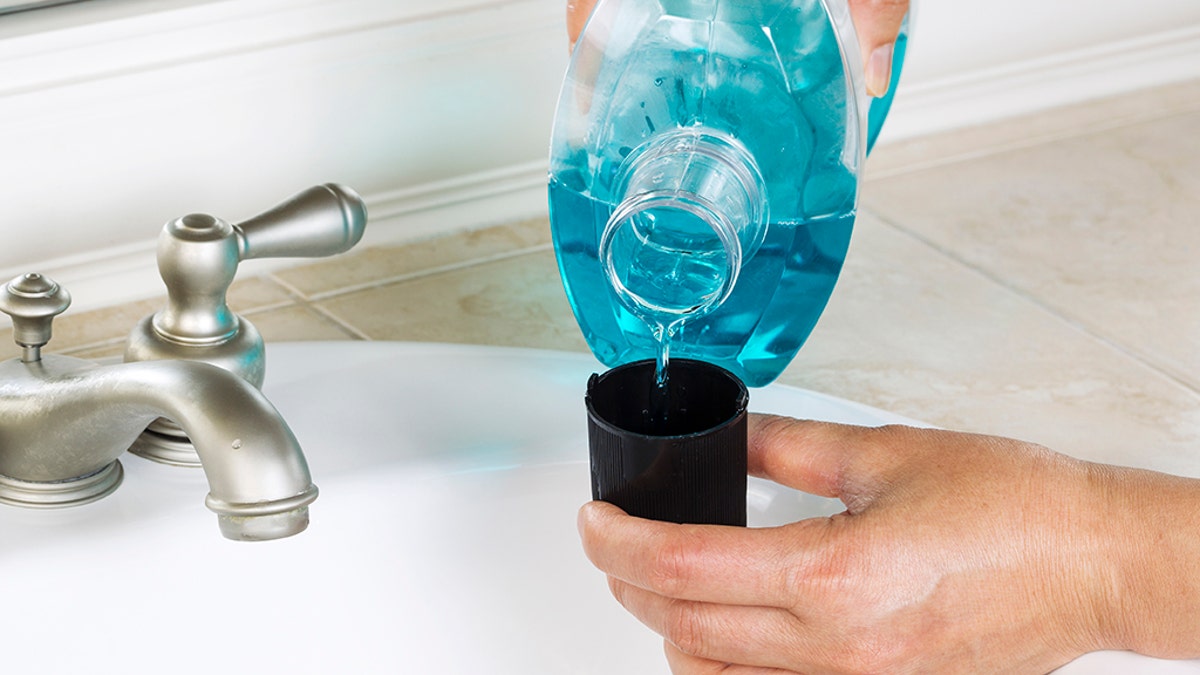Fox News Flash top headlines for May 15
Fox News Flash top headlines are here. Check out what's clicking on Foxnews.com.
Get all the latest news on coronavirus and more delivered daily to your inbox. Sign up here.
While a cure for the deadly COVID-19 has yet to be found, a new study suggests that mouthwash could play a role in preventing its transmission.
The research, published in the scientific journal Function, notes "the importance of the throat and salivary glands as sites of virus replication and transmission in early COVID-19 disease," adding SARS-CoV-2 is an "enveloped virus," one that has an "outer lipid membrane derived from the host cell from which it buds."
"We highlight that already published research on other enveloped viruses, including coronaviruses, directly support the idea that oral rinsing should be considered as a potential way to reduce transmission of SARS-CoV-2," the researchers wrote in the study's abstract.

(iStock)
CORONAVIRUS INFECTIONS WOULD PLUNGE IF 80 PERCENT OF PEOPLE WORE MASKS, STUDY SAYS
The spike proteins on the surface of the envelope of coronaviruses (which get their name from the spikes that make them look like crowns), allows them to identify and join receptor sites on a cell's membrane, ultimately leading to the infection. It's possible the chemicals in the mouthwash could "disrupt the lipid membranes of several enveloped viruses," the researchers said in the statement.
Mouthwash is made up of a number of ingredients, including ethanol, povidone-iodine and cetylpyridinium.
The scientists added they are uncertain how long mouthwash components "retain an ability to interact with biomembranes in the mouth," pointing out that further research is needed.
“Safe use of mouthwash – as in gargling – has so far not been considered by public health bodies in the UK," the study's lead author, Cardiff University professor Valerie O'Donnell said in a statement. "In test tube experiments and limited clinical studies, some mouthwashes contain enough of known virucidal ingredients to effectively target lipids in similar enveloped viruses."
However, O'Donnell, who is also co-director of the University's Systems Immunity Research Institute, was keen to explain this has not been tested yet and people should continue to adhere to measures put forth by lawmakers.
“Mouthwash has not been tested against this new coronavirus yet," O'Donnell added. "People should continue to follow the preventive measures issued by the UK government, including washing hands frequently and maintaining social distance. This study suggests further clinical studies could be worthwhile based on the theoretical evidence.”
O'Donnell said this is an "under-researched area of major clinical need."
CORONAVIRUS APP FINDS LOSS OF TASTE AND SMELL MAY BE BETTER INDICATORS THAN FEVER, COUGH: STUDY
In a February post to its Facebook page, the World Health Organization said, "There is no evidence that using mouthwash will protect you from infection with the new coronavirus."
A spokesman for the WHO said,"there is no evidence that using mouthwash will protect you from infection with the new coronavirus."
"Some brands of mouthwash can eliminate certain microbes for a few minutes in the saliva in your mouth," the spokesman added. "However this doesn’t mean they protect you from COVID-19 infection."
In a statement posted to its website, Johnson & Johnson, which makes Listerine mouthwash, said rinsing with it does not kill the virus.
"[Listerine] mouthwash has not been tested against the coronavirus and is not intended to prevent or treat COVID-19," the company wrote. "Consumers should follow the preventive measures issued by the World Health Organization including washing hands frequently, maintaining social distance and avoid touching your eyes, nose and mouth."
Listerine added that it should also not be used as a substitute for hand sanitizer, as it only contains around 20 percent alcohol. The Centers for Disease Control and Prevention recommends hand sanitizers have 60 percent alcohol.
CLICK HERE FOR COMPLETE CORONAVIRUS COVERAGE
As of Friday morning, more than 4.4 million coronavirus cases have been diagnosed worldwide, more than 1.42 million of which are in the U.S., the most impacted country on the planet.









































